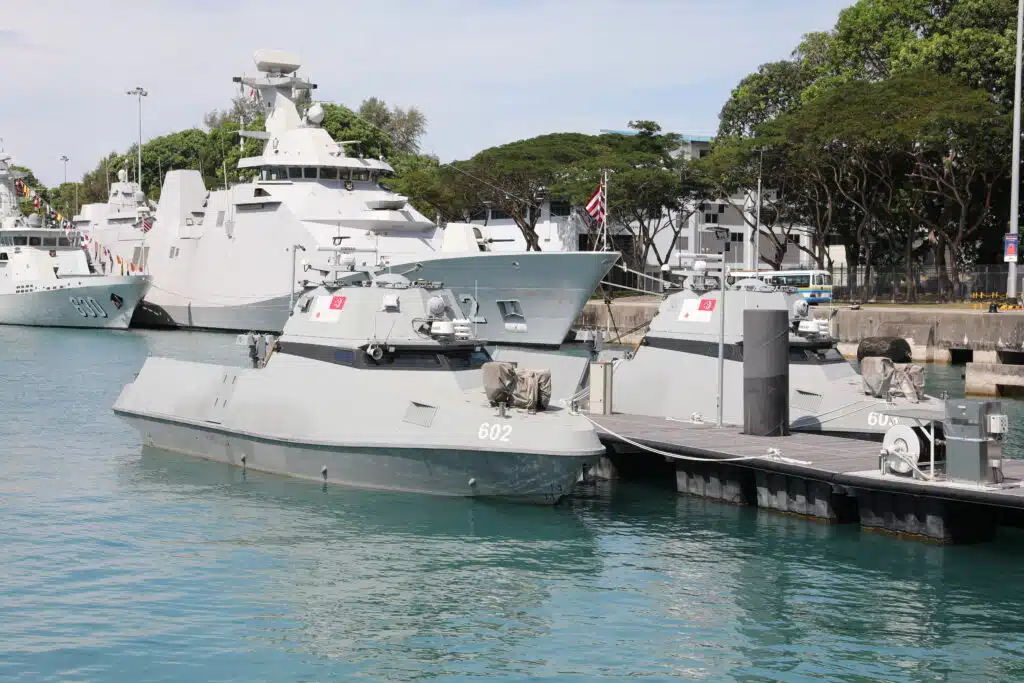Singapore has become a pioneer in the use of unmanned vessels (USVs) to ensure maritime security, informs Latvian company "Dronelab" SIA. Since January 2025, the Royal Singapore Navy (RSN) has been conducting operational patrols with MARSEC USVs, which are 16.9-metre long, 30-tonne vessels that are armed and capable of operating fully autonomously. These vessels are equipped with advanced technology, including a collision detection and avoidance (CDCA) system, which allows them to navigate safely through the heavy traffic in the Singapore Strait.
MARSEC UPS main functions:
- Patrols: USVs conduct regular patrols in Singapore waters, monitoring vessel traffic and identifying suspicious vessels.
- Escort: USVs can accompany important ships, providing an additional level of security.
- Maritime Threat Investigation: USVs are capable of responding to maritime threats, such as piracy or terrorism, and conducting investigations.
Technologies that ensure the operation of MARSEC USV:
- CDCA system: This autonomous system allows the USV to navigate safely, avoiding collisions with other vessels and obstacles.
- Sensor systems: USVs are equipped with a variety of sensors, including radars, automatic identification systems, and differential GPS, which provide information about the surrounding environment.
- Communication systems: The USV can communicate with the shore control center via satellite and radio communications.
- Weapon systems: Some USVs are equipped with weapons systems, such as remote weapon stations, to be able to respond to threats.
Benefits of using UPS:
- Increasing efficiency: USVs can perform tasks that previously had to be performed by crewed ships, freeing up resources for other tasks.
- Cost reduction: Operating a USV is cheaper than operating a crewed vessel.
- Security improvement: USVs can operate in hazardous environments where the use of crewed vessels would be risky.

Singapore's experience with the MARSEC USV has shown that unmanned vessels have great potential to enhance maritime security. The technology is developing rapidly, and in the future we can expect even more widespread use of USVs for a variety of tasks, including mine detection and disposal.
Further research:
- Impact of USV on maritime traffic safety.
- Ethical and legal aspects of using USV.
- The potential of USVs for performing other maritime tasks, such as environmental monitoring and rescue operations.

Conclusions:
Singapore's experience with the MARSEC USV is a significant step forward in the development of unmanned vessel technology. This technology offers new opportunities for enhancing maritime security and could fundamentally change the way navies operate in the future.
The presence of unmanned aerial vehicles (UAVs) in Singapore waters may affect yacht and boat operators.
Although MARSEC USVs are equipped with collision avoidance systems, yacht and boat operators should take precautions when encountering the following vessels:
Recommendations for yacht and boat drivers:
- Be informed: Yacht and boat operators should be aware of the presence of USVs in Singapore waters and be aware of their operating principles.
- Follow the rules: Always comply with the International Regulations for Preventing Collisions at Sea (COLREGs).
- Keep a safe distance: Keep a safe distance from the USV to avoid collisions.
- Make an observation: Carefully observe your surroundings and pay attention to the movement of the USV.
- Contact if necessary: If in doubt or confusion, contact the coast guard or the nearest vessel traffic control center.
- Use AIS: Make sure your Automatic Identification System (AIS) is turned on and working properly so that the USV can identify you.
It is important to remember that USVs are equipped with sensors and algorithms that allow them to navigate safely and avoid collisions. However, yacht and boat operators must be vigilant and take the necessary precautions to ensure safety on the water.
More information:
- The Royal Singapore Navy (RSN) could publish information on USV operating zones and advice to yacht and boat operators.
- Maritime traffic control centers can provide information on the presence and movement of USVs in real time.
By following these recommendations, yacht and boat operators can safely navigate Singapore waters and coexist with USVs.

